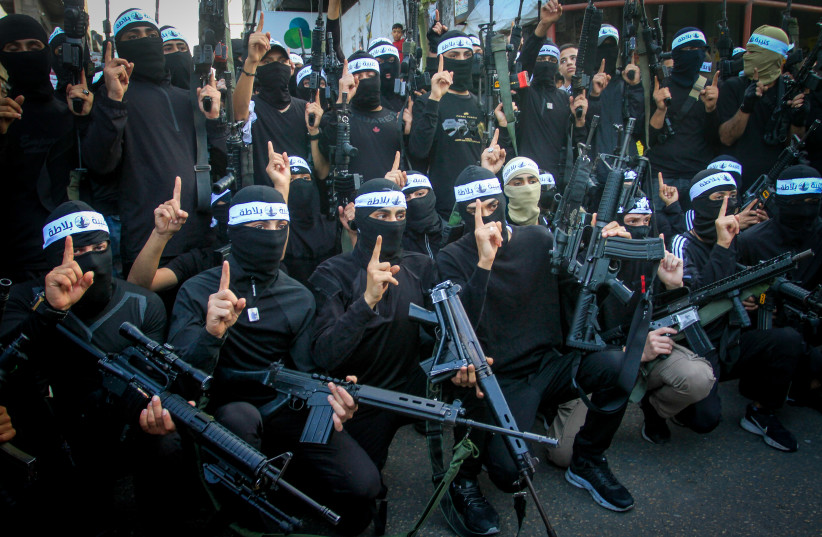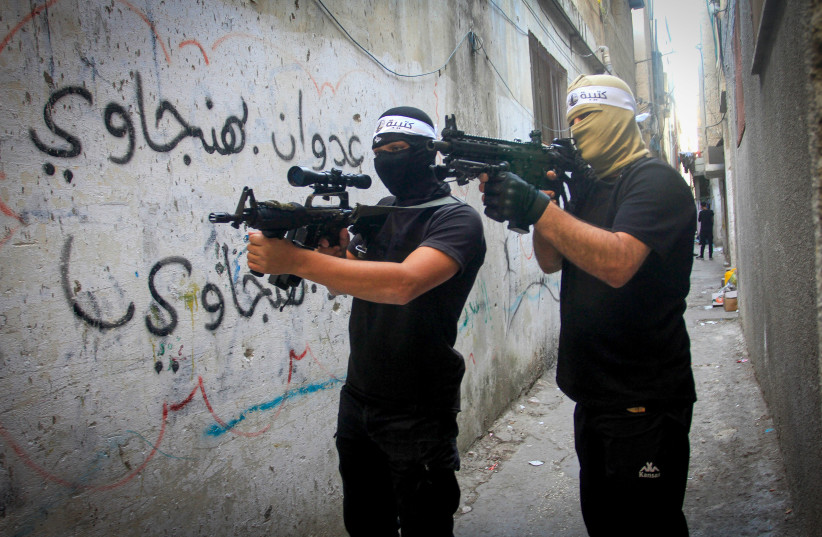Palestinian Fatah gunmen increase activities in Israel’s West Bank.

The ruling Fatah faction headed by PA President Mahmoud Abbas is set to celebrate the 58th anniversary of the launch of its first armed attack against Israel.
This year’s anniversary comes as the faction’s armed wing, al-Aqsa Martyrs Brigades, has increased its activities, particularly in Nablus and Jenin, more than 10 years after the group seemed to have vanished.
In the past year, Palestinian Authority security forces have done almost nothing to stop the group from operating within areas under its control.
In several places, the Fatah gunmen have replaced the PA security services as the main law-enforcers.
The growing cooperation between al-Aqsa Martyrs Brigades and other groups, including Hamas and Palestinian Islamic Jihad, has raised concern among some senior Fatah officials, who are nevertheless reluctant to speak out for fear of being accused of undermining Palestinian unity.

As long as the cooperation is directed only against Israel, the Fatah officials see no reason why they should turn against their own loyalists. Such cooperation was extremely rare in the past.
The activities of the Palestinian Authority’s al-Aqsa Martyrs Brigades
In the past few days, al-Aqsa Martyrs Brigades, which first appeared at the beginning of the Second Intifada, claimed responsibility for three shooting attacks in the northern West Bank. During the intifada, the group was responsible for hundreds of terror attacks against Israelis.
The group recently took credit for several shooting attacks on Israeli soldiers and civilians in the vicinity of Joseph’s Tomb in Nablus, the village of Beit Umar near Hebron and other areas.
Since the death last week of Nasser Abu Hmeid, one of the founders and top commanders of al-Aqsa Martyrs Brigades, the group has issued a number of statements in which it threatened to avenge his death.
Abu Hmeid, 50, of al-Am’ari Refugee Camp near Ramallah, died of cancer while serving seven life sentences in Israeli prison for his role in a series of deadly attacks against Israelis during the Second Intifada.
Like many Palestinians, al-Aqsa Martyrs Brigades claimed Abu Hmeid died as a result of “medical negligence.”
Earlier this week, the group called for a “day of rage” to protest Israel’s decision not to hand over Abu Hmeid’s body to his family for burial. The decision was made in accordance with Israel’s policy of holding on to bodies of terrorists for future prisoner exchanges with Palestinian groups.
Although the group called for a “general mobilization” and promised – immediately after the death of Abu Hmeid – that the West Bank “will be on fire tonight,” the Palestinian street has failed to erupt into violence. The apathy is attributed to the declining popularity of Abbas and the Fatah-dominated PA.
Al-Aqsa Martyrs Brigades returned to center stage at the beginning of this year when Israeli security forces killed three of its members in Nablus: Ashraf al-Mubaslat, Adham Mabrouk and Mohammed al-Dakhil. The three were responsible for a spate of shooting attacks targeting Israeli soldiers and civilians.
A few months later, the group suffered yet another major blow when a prominent and popular member, Ibrahim al-Nabulsi, was killed by Israeli troops in the Old City of Nablus.
For some Fatah leaders, the re-emergence of gunmen on the streets of Palestinian cities, villages and refugee camps, as well as their involvement in the “resistance” against Israel, is a welcome development. These leaders now have a chance to prove that this is not the case.
Fatah has long been accused by its political rivals of abandoning the armed struggle against Israel in favor of negotiations and a peaceful settlement.
The PA security forces, which consist almost entirely of Fatah loyalists, have been repeatedly accused of failing to fulfill their duty to defend Palestinians during IDF raids into their communities. Worse, these forces are often accused of “collaboration” with Israel because of the security coordination with the Israeli security forces.
In recent months, however, senior Fatah officials have been boasting about the role of al-Aqsa Martyrs Brigades in the fight against Israel. They have been praising the Fatah gunmen as heroes and several leaders of the faction make it a point to visit the families of gunmen killed by the IDF to offer their condolences.
Scenes of Fatah gunmen on the streets of refugee camps in Jenin and Nablus serve to remind the Palestinian public that, despite Abbas’s and Fatah’s repeated calls for a “peaceful popular resistance,” the faction has not relinquished the armed struggle option against Israel.
The presence of the gunmen on the streets also aims to serve as a counterbalance to other groups, specifically Hamas and PIJ, which have become very popular in the northern West Bank over the past few years.
The absence of the gunmen from the public eye would create the impression that Hamas and PIJ are the only groups engaging the Israeli security forces on the ground. This is something Fatah cannot afford.
Although some members of al-Aqsa Martyrs Brigades have criticized Abbas and other Palestinian leaders, most of the group’s leaders and gunmen in the West Bank are hesitant to openly challenge the Ramallah-based leadership.
The PA, for its part, is careful not to come out publicly against the gunmen as long as they do not pose a direct and serious threat to the Palestinian leadership.
In the past, some unruly Fatah gunmen were targeted by the PA security forces, but that happened only when there was suspicion that they had received money from Abbas’s political rivals, including Mohammed Dahlan.
The PA fears that a crackdown on the gunmen would spark a crisis within Fatah and drive many of its members toward Hamas and PIJ. The PA, in addition, is aware that any measures it might take against the gunmen would be unwelcome by the Palestinian public.
The Fatah leadership, meanwhile, is trying to show that its struggle against Israel is not only limited to military action, but also to diplomatic efforts in the international arena.
The Fatah leadership is also seeking to place itself at the forefront of the Palestinian campaign against the incoming right-wing government headed by prime minister-designate Benjamin Netanyahu.
In a statement on the occasion of the anniversary of its first attack against Israel, Fatah declared: “Just as we thwarted the ‘Deal of the Century’ and the annexation project, we will defeat the new fascists.”
The “Deal of the Century” refers to former US president Donald Trump’s plan for peace in the Middle East. The annexation project refers to the since-shelved plan of the previous Netanyahu government to extend Israeli sovereignty to portions of the West Bank.
Many Palestinians have denounced the far-right parties and candidates who won the November 1 Israeli general elections as “fascists and racists.”
The statement did not mention the renewed activities of Fatah’s armed group. But it hinted that the Palestinians could step up the violence against Israel.
Fatah warned that its “strugglers” would “confront all challenges and threats facing our national cause, first and foremost the attempts by the occupation to cancel the historical presence of our people.”
The statement is seen by some Palestinians as an indirect message to the Fatah gunmen in the West Bank to prepare for a possible large-scale confrontation with Israel.
And this is all happening as the battle of succession in the PA leadership continues to heat up.
In the absence of a powerful leader or unified command for the gunmen, it’s possible that al-Aqsa Martyrs Brigades could split into a number of rival militias that are affiliated with more than one Fatah leader soon after Abbas’s departure from the scene.
Under such a scenario, Palestinians do not rule out the possibility that the Fatah gunmen could turn against each other.
Content retrieved from: https://www.jpost.com/arab-israeli-conflict/article-725859?s=04&fbclid=IwAR347znQIsV1O58BtxVzpU4vhVHKaAwfRVvAM37Lyhq6V56FOoITAveFA_k.